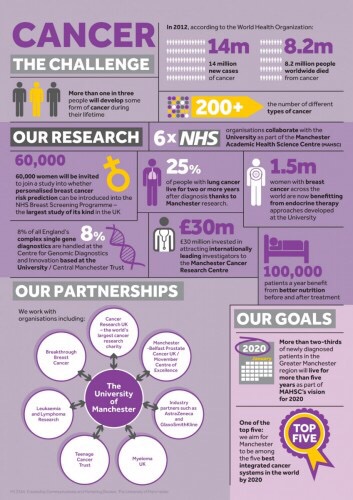Manchester is set to receive a major cash injection from Cancer Research UK.
The charity plans to invest around £39 million over the next five years into the Cancer Research UK Manchester Centre, a partnership between Cancer Research UK, The University of Manchester and the Christie NHS Foundation Trust.
Manchester has been chosen, by an international panel of experts, as one of just 13 locations to secure funding in the latest review of the Cancer Research UK Centres network of excellence and one of two to receive major centre status – the highest award.
The grant will fund ground-breaking work as part of the development of a unique chain of cutting-edge research hubs around the UK focusing on translational research.
A further £2.75 million investment is planned for the Manchester Experimental Cancer Medicine Centre, from Cancer Research UK and the National Institute for Health Research.
Funding will also support training of the next generation of cancer researchers – including 45 PhD students – to ensure the brightest scientists are attracted and supported in their career in cancer research.
Professor Nic Jones, Director of the Cancer Research UK Manchester Centre, based at The University of Manchester, said: “This funding award is fantastic news for the city and for our Centre and we are especially honoured to be selected as a Major Centre. The award represents a critical investment in the research infrastructure that will equip us with the tools needed to advance the understanding and treatment of cancer.
“This investment will boost efforts to transform treatments through the development of new approaches in personalised medicine.
“Our aim is to transform cancer treatment by optimising the delivery of radiotherapy, and by developing new approaches to treatment where decisions are guided by the specific characteristics of a patient’s tumour. This includes studying and characterising blood samples taken from patients at diagnosis and throughout their journey. We do this to look for markers released from the tumour that can provide key information to help doctors pick the right drug for the right patient.
“We also aim to detect early warning signs of cancer to provide earlier diagnosis, or to give a clear indication if a patient’s cancer has come back after treatment.”







